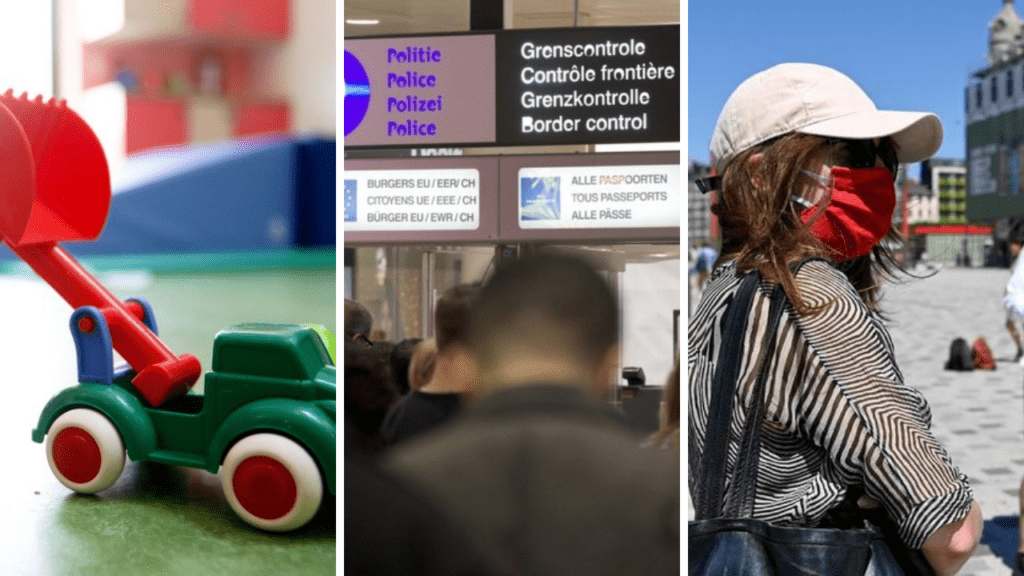As has often been the case in Belgium, clarity on one thing leads to many new questions on others.
On Wednesday, it was announced that returning travellers would be tested and quarantined upon arrival in Belgium, depending on whether they have been in what the authorities consider a green, orange or red zone.
There will be a formal travel ban for "red zones" with returnees required to be tested and quarantined once back in Belgium. Returnees from "orange zones" have no obligation, but will be asked to do the same. "Green zone" travellers do not have to worry about anything, and can leave and return without issues.
However, when this was announced, nothing else was clear yet. Which zones will get which colours? What happens when a zone changes colour when you're there? How can the authorities check everyone who returns by car, for example?
On top of that, the decision that high-risk returnees need to quarantine was made for the entire country, but legal arrangements on how to enforce those quarantines are a regional competence, making everything even more difficult.
Flanders announced that ignoring quarantine could be punished by high fines and even a prison sentence, but Brussels and Wallonia have not announced or made a decision yet.
If and when we know more, so will you.
With so much information, and so little time to catch up before it potentially changes again, here are some of the top stories from around the country to get you up to speed.
1. Belgium to re-ban travel to infected EU zones
Belgium will issue a formal travel ban to areas in the Schengen zone that have been put back in lockdown and are considered a very high health risk.
On Wednesday, it was decided that Belgium will put in place a formal travel ban to foreign cities, towns, municipalities, districts, regions or countries that have been placed back in lockdown, which Belgium considers “red zones.”
“Only the principle has been decided, the practical arrangements have not yet been determined,” Arnaud Gaspart, spokesperson for the Foreign Affairs Department, told The Brussels Times. Read more.
2. A new peak ‘could be only a month away,’ says Marc Van Ranst
A new peak of cases of Covid-19 could be only a month away, given the current situation of the epidemic in Belgium, according to virologist Professor Marc Van Ranst.
Speaking in an interview with De Morgen, Van Ranst warned that the number, though much lower than the 2,000 or so a day at the height of the epidemic, was still too high.
“I still think that is a very high figure. Despite all the measures, despite all the things we know about this virus, we are still having 85 new cases being added. That’s 85 new people on top of yesterday’s 85. And they can each infect other people for about five days.” Read more.
3. Flanders punishes ignoring quarantine with €4,000 fine and prison
Travellers returning to Belgium from high-risk areas who do not respect the mandatory quarantine will risk a fine of up to €4,000 and up to six months in prison, according to the cabinet of Flemish Health Minister Wouter Beke.
Belgium will introduce a system with colour codes, in which areas will be labelled green, orange or red. A travel ban will be issued for areas labelled as “red zones,” which are considered very high-risk areas. People returning from such an area are required to be tested and quarantined on arrival.
Returnees ignoring that obligation will receive the penalties included in the Flemish Prevention Decree, which now only applies to those who are already infected. Read More.
4. Belgian daycares should close only with two Covid-19-positive kids
Daycares taking in toddlers under the age of 3 should close only if one staff member or at least two kids in the same bubble test positive for Covid-19.
In an update to its guidelines, federal health institute Sciensano said daycares should only close if a Covid-19 cluster, made up of two children in the same group, emerges in their structure.
The only other scenario under which child care providers should shutter is if at least one member of staff is confirmed as Covid-19 positive, Sciensano said. Read More.
5. Make wearing masks in stores mandatory, says Superior Health Council
Belgium’s Superior Health Council, the scientific advisory body for the Federal Public Health Service, published advice on Wednesday, in which it recommends making it compulsory to wear a face mask in stores.
The Superior Health Council announced its recommendation “in view of the scientific evidence concerning the usefulness of wearing a mask and the public health emergency.”
“The virus could not only be spread by direct contact and droplets, but also by microdroplets that are much smaller and remain in the air for up to three hours,” Nicolas Van Larebeke, scientific expert of the High Health Council, said. Read more.
6. Belgium’s average of new infections per day increases again
An average of 86 people per day tested positive for the new coronavirus (Covid-19) in Belgium, according to figures by the Federal Public Health Service on Thursday.
The total number of confirmed cases in Belgium, since the beginning of the pandemic, is 62,210. The total reflects all people in Belgium who have been infected, and includes confirmed active cases as well as patients who have since recovered, or died from the consequences of the virus.
The trend already stopped decreasing on Wednesday compared to the daily average of new infections the week before, and increased slightly by 1% on Thursday. Read more.
7. Amsterdam-London Eurostar journey will be reduced by an hour
Taking the Eurostar from Amsterdam to London will take an hour less of your time in the future, after the Netherlands signed a treaty with Belgium, France and the UK.
After the summer, the Eurostar will directly link Amsterdam and London for the first time. Up until now, those who boarded the Eurostar in Amsterdam still had to undergo passport control at Belgium’s Brussels-Midi station, costing them an hour travel time. Read more.
Maïthé Chini
The Brussels Times



